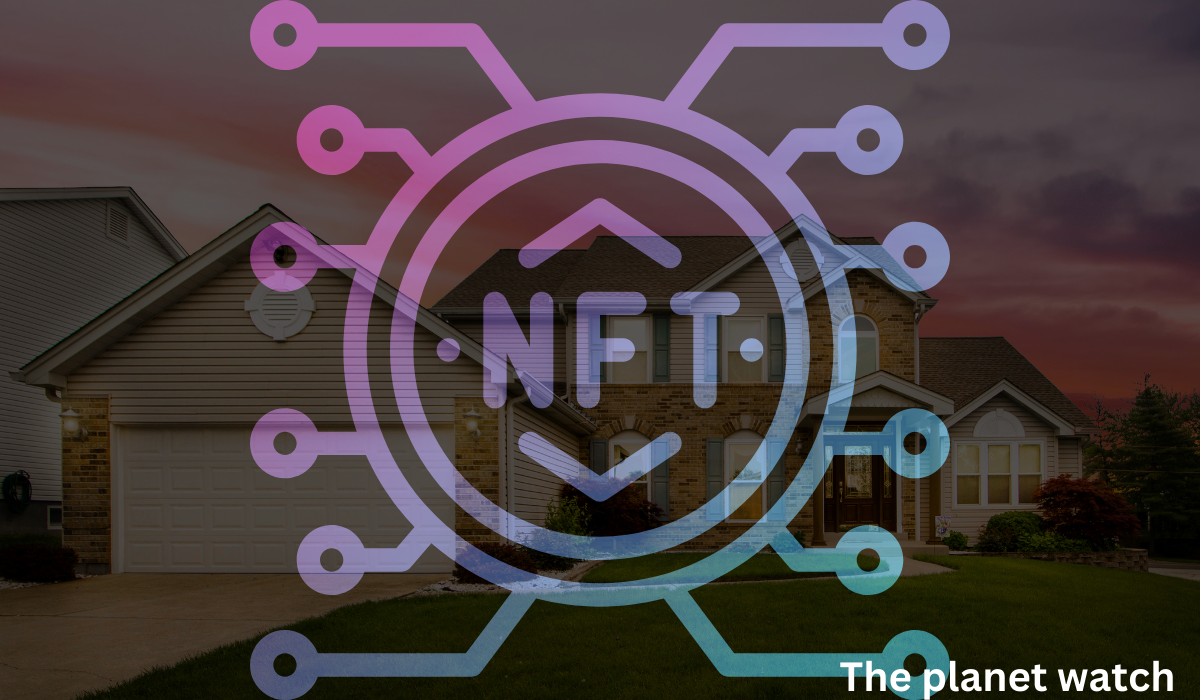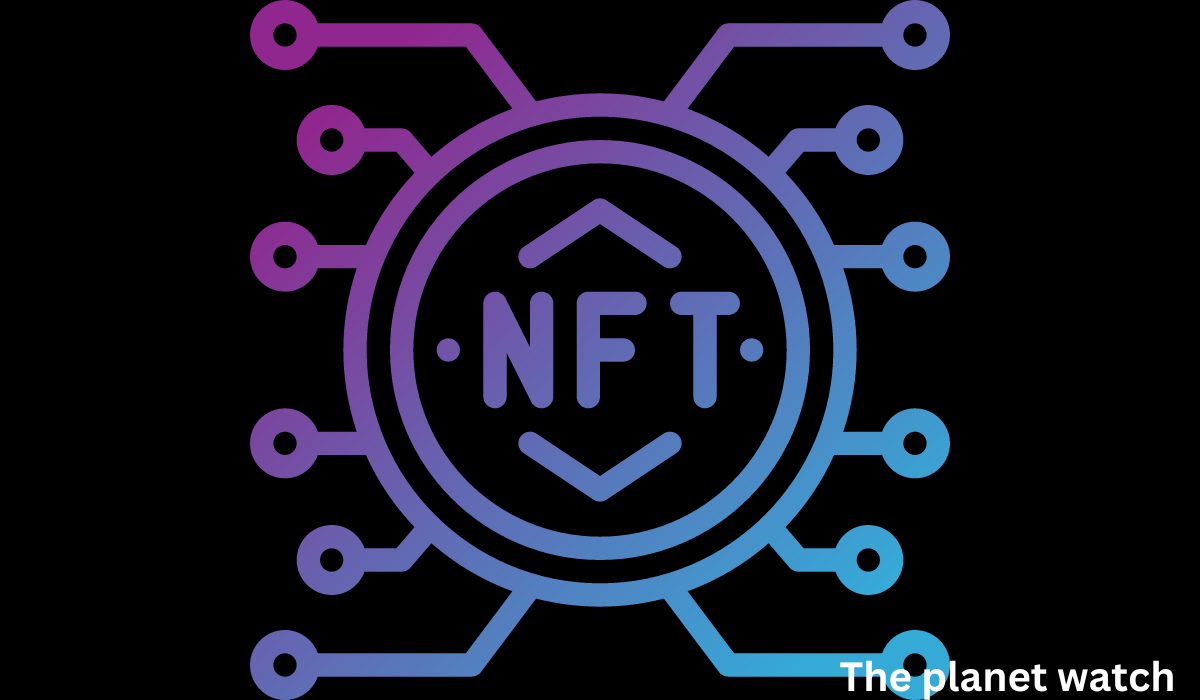NFTs and Real estate :
“NFTs have the potential to transform the real estate industry through property tokenization, which allows for increased global liquidity and the possibility of fractional ownership. The underlying blockchain technology of NFTs guarantees secure, transparent, and efficient real estate transactions, reducing the usual procedural complexities.
For real estate agents, embracing NFT technology signifies groundbreaking methods of transferring ownership, streamlining property transactions, and broadening their market outreach. However, there are still some hurdles to overcome, including gaining government recognition, integrating with conventional systems, and addressing the volatility associated with cryptocurrencies.”

What Are NFTs ? before understadnig connection between NFTs and Real estate .
Non-Fungible Tokens (NFTs) are unique digital assets that represent ownership or proof of authenticity of a specific item or piece of content, using blockchain technology. Each NFT is distinct and cannot be exchanged on a one-to-one basis with any other token, as they have individual characteristics or attributes that set them apart. This makes them particularly valuable for representing rare or collectible digital items, such as art, music, virtual real estate, in-game items, and more. NFTs have gained significant attention and popularity in various creative industries and digital marketplaces.

How transactions occurs between NFTs and Real estate ?
Using their unique characteristics, NFTs serve as tools to convert valuable physical assets, such as real estate, into digital format. This means that assets can potentially be represented as tokenized assets and securely recorded on the blockchain.
The integration of tokenized real estate on the blockchain provides a means for potential buyers to acquire physical assets in the form of NFTs, regardless of their location in the world. The goal is to leverage the benefits of digital assets, including transparency, faster transactions, and long-lasting data storage.
As a result, this approach simplifies the overall real estate transaction, avoiding traditional processes. NFTs can provide buyers the opportunity to invest in fractional ownership of assets.
Unpacking the Impact of NFTs and Real Estate Transactions
“Revolutionizing Real Estate with NFTs: Tokenization, Fractional Ownership, and More in transactions of NFTs and Real estate
The integration of NFTs and real estate sector involves converting physical assets into digital tokens on the blockchain, increasing accessibility and liquidity.
Fractional Ownership Opportunities
NFT-based tokenization enables fractional ownership of real estate. Instead of purchasing the entire asset, investors can acquire a portion of it through NFTs. This democratizes real estate investing, opening doors to a wider range of investors.
Efficient transactions
NFTs have the potential to streamline real estate transactions, reducing the time and costs associated with traditional methods. Using NFTs, buyers and sellers can interact directly, bypassing the need for intermediaries like banks and lawyers. This speeds up deals and reduces transaction costs.
Increase transparency and security
NFTs offer better transparency and security than traditional real estate transactions. Blockchain technology, integral to NFT creation, ensures an immutable record of ownership, virtually eliminating the risk of counterfeiting. This strengthens security in transactions, giving all parties a clear understanding of transaction history and ownership.
global market access due to NFTs and Real estate
NFTs empower real estate entities to enter previously inaccessible international markets. With NFTs, asset transactions can occur 24/7, making deals possible from any corner of the world. This increased market activity creates new opportunities for both real estate firms and investors.
Smart contracts optimized for real estate
NFTs also have the ability to generate smart contracts, self-executing agreements that enforce the terms of the deal. In real estate transactions, these contracts can automate processes such as property appraisal and title transfer, further simplifying the transaction process.”
Benefits of Tokenization between NFTs and Real estate for Buyers and Sellers
Tokenizing the real estate market has a number of benefits for both buyers and sellers involved in the transaction. Here’s a closer look at these benefits:
- Secure Documents on Blockchain
By storing ownership documents on the blockchain, both buyers and sellers can have confidence in the security and clarity of property transactions. Tokenized real estate establishes an accurate record of ownership with dates of acquisition. - Persistent asset history on the blockchain
Buyers gain valuable information about the history of the property, gaining access to comprehensive data on all the transactions that have been part of it over the years. This may include any improvements or maintenance done to the property. - Trusted Asset Exchange
Storing real estate data on the blockchain ensures trustless exchange. Transaction data is reliable, secure and permanent. - Streamlined Process, Less Paperwork
The process takes a streamlined approach, eliminating the need for extensive paperwork and associated fees in traditional transactions. Every detail is easily available on the blockchain with just a few clicks. - Optimized Transaction Speeds
Ownership transfers are significantly expedited, a marked change from traditional methods, which can span weeks or months depending on bank involvement and geographic locations.In contrast, crypto payments are almost instantaneous. Once an agreement is reached between the seller and the buyer, the buyer simply needs to transfer the agreed crypto amount from his wallet to the seller. As a result, tokenizing real estate has the potential to reduce the purchase process to a transaction processed in minutes depending on network traffic.
Agents Adopting NFTs and Real Estate
“Revolutionizing Homeownership Transfer with Tokenized Real Estate
In today’s dynamic real estate landscape, embracing NFTs and Real estate estate presents a cutting-edge approach for realtors. This innovative technology not only adds an extra layer of security and transparency to client interactions and document sharing but also positions realtors as adept professionals in the eyes of their younger clientele, potentially resulting in increased sales and commissions.
Build Trust with Clients
Leveraging the power of blockchain, all transaction records are securely stored, ensuring easy access and complete transparency. This instills a higher level of trust in agents, as clients can be confident that no one can tamper with or manipulate critical data.
Streamline Ownership Transfers
NFTs and Real estate streamlines the process of transferring ownership rights, providing agents with more efficient workflows. This newfound efficiency can translate into more time for realtors to focus on their clients or seize additional property sales opportunities.
Unleash Global Market Potential because of NFTs and Real estate
Realtors now have the opportunity to expand their market reach on an international scale. By enabling buyers and sellers to connect and transact irrespective of geographic borders, real estate professionals can unlock a world of potential, potentially leading to improved commissions and heightened sales figures.
Incorporating tokenized real estate into your realty toolkit not only modernizes your approach but also empowers you to stay ahead in an ever-evolving industry.”
“Challenges in the Adoption of NFTs and Real estate
For NFTs and Real estate to become a standard practice, it is imperative to establish uniform standards and gain legal recognition across various countries. This underscores the critical importance of government acceptance in this emerging concept.
This also entails aligning with government regulations and obtaining endorsement for blockchain as legally admissible records, which present substantial hurdles.
Complexity and Understanding Tokenizing real estate is a relatively nascent concept and can be intricate, potentially leading to confusion and misinterpretation. This lack of comprehension may act as a barrier to adoption and could deter potential investors.

Technology Risks Inherent in any blockchain-based solution is the risk of hacks and cyber threats. The loss of private keys can result in the irreversible loss of assets.
Valuation Challenges Accurately determining the value of a tokenized property can be daunting due to the current volatility experienced in the cryptocurrency market. These fluctuating token values can pose risks to both investors and sellers. However, stablecoins may play a role in mitigating the challenge of crypto price volatility.
Integration with Traditional Systems Harmonizing NFTs and Real estate systems and practices can be a challenging endeavor and may encounter resistance from entrenched players in the real estate sector.
Fraud Risks Given the early-stage adoption of real estate tokenization, there is an elevated potential for fraud and scams.
Tax Implications The tax treatment of buying, selling, and holding NFTs and Real estate remains uncertain in many jurisdictions, potentially resulting in unforeseen tax liabilities.”
Here are some frequently asked questions (FAQs) based on the NFT and real estate
Certainly! Here are the FAQs based on the provided article:
1. how are NFTs and real estate related?
- NFTs, or Non-Fungible Tokens, are unique digital assets that represent ownership or proof of authenticity of specific items. In the context of real estate, NFTs are used to convert physical properties into digital tokens on a blockchain, adding security and transparency to transactions.
2. How do NFTs enhance transparency in real estate transactions?
- NFTs ensure secure and transparent real estate transactions through the use of blockchain technology. This eliminates many traditional procedural complexities associated with real estate deals.
3. How can NFTs and real estate tokenizing benefit real estate agents?
- For real estate agents, adopting NFT technology allows for innovative ownership transfers, simplified property transactions, and expanded market reach. However, there are still challenges such as government acceptance and crypto volatility that need to be addressed.
4. What exactly are NFTs and how do they differ from other tokens?
- NFTs, or Non-Fungible Tokens, are unique digital assets with distinct attributes that set them apart from other tokens. Unlike fungible tokens (which are interchangeable on a one-to-one basis), NFTs cannot be exchanged with any other token.
5. How do NFTs impact the valuation of tokenized properties?
- Valuing tokenized properties accurately can be challenging due to the inherent volatility in the cryptocurrency market. Fluctuating token values can pose risks for both investors and sellers, though stablecoins may help address this challenge.
6. What challenges does NFTs and real estate face for widespread adoption?
- Challenges include the need for standardization and legalization across countries, alignment with government regulations, and integration with traditional systems. Other hurdles include the complexity of the concept, technology risks, and potential fraud.
7. How can NFTs expand global market access for real estate entities?
- NFTs empower real estate entities to tap into international markets. With NFTs, property transactions can occur 24/7, allowing deals to be executed from any global location. This increased market liquidity creates new opportunities for both real estate firms and investors.
8. What role do smart contracts play in NFT-based real estate transactions?
- NFTs have the capability to generate smart contracts, which are self-executing agreements that enforce the terms of a deal. In real estate transactions, these contracts can automate procedures such as property appraisals and title transfers, further simplifying the transaction process.
Can you be more specific about the content of your article? After reading it, I still have some doubts. Hope you can help me.